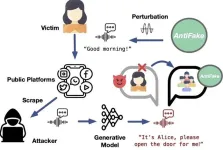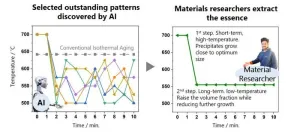(Press-News.org) Recent advances in generative artificial intelligence have spurred developments in realistic speech synthesis. While this technology has the potential to improve lives through personalized voice assistants and accessibility-enhancing communication tools, it also has led to the emergence of deepfakes, in which synthesized speech can be misused to deceive humans and machines for nefarious purposes.
In response to this evolving threat, Ning Zhang, an assistant professor of computer science and engineering at the McKelvey School of Engineering at Washington University in St. Louis, developed a tool called AntiFake, a novel defense mechanism designed to thwart unauthorized speech synthesis before it happens. Zhang presented AntiFake Nov. 27 at the Association for Computing Machinery’s Conference on Computer and Communications Security in Copenhagen, Denmark.
Unlike traditional deepfake detection methods, which are used to evaluate and uncover synthetic audio as a post-attack mitigation tool, AntiFake takes a proactive stance. It employs adversarial techniques to prevent the synthesis of deceptive speech by making it more difficult for AI tools to read necessary characteristics from voice recordings. The code is freely available to users.
“AntiFake makes sure that when we put voice data out there, it’s hard for criminals to use that information to synthesize our voices and impersonate us,” Zhang said. “The tool uses a technique of adversarial AI that was originally part of the cybercriminals’ toolbox, but now we’re using it to defend against them. We mess up the recorded audio signal just a little bit, distort or perturb it just enough that it still sounds right to human listeners, but it’s completely different to AI.”
To ensure AntiFake can stand up against an ever-changing landscape of potential attackers and unknown synthesis models, Zhang and first author Zhiyuan Yu, a graduate student in Zhang’s lab, built the tool to be generalizable and tested it against five state-of-the-art speech synthesizers. AntiFake achieved a protection rate of over 95%, even against unseen commercial synthesizers. They also tested AntiFake’s usability with 24 human participants to confirm the tool is accessible to diverse populations.
Currently, AntiFake can protect short clips of speech, taking aim at the most common type of voice impersonation. But, Zhang said, there’s nothing to stop this tool from being expanded to protect longer recordings, or even music, in the ongoing fight against disinformation.
“Eventually, we want to be able to fully protect voice recordings,” Zhang said. “While I don’t know what will be next in AI voice tech — new tools and features are being developed all the time — I do think our strategy of turning adversaries’ techniques against them will continue to be effective. AI remains vulnerable to adversarial perturbations, even if the engineering specifics may need to shift to maintain this as a winning strategy.”
***
Yu Z, Zhai S, and Zhang N. AntiFake: Using adversarial audio to prevent unauthorized speech synthesis. Proceedings of the 2023 ACM SIGSAC Conference on Computer and Communications Security, Nov. 26-30, 2023. DOI: https://doi.org/10.1145/3576915.3623209. Code: https://sites.google.com/view/yu2023antifake.
This work was supported by the National Science Foundation and Army Research Office.
Originally published on the McKelvey School of Engineering website.
END
Defending your voice against deepfakes
McKelvey engineers prevent synthesis of deceptive speech by making it more difficult for AI tools to read voice recordings
2023-11-27
ELSE PRESS RELEASES FROM THIS DATE:
Revolutionizing cancer treatment through programmable bacteria
2023-11-27
What if a single one-dollar dose could cure cancer?
A multi-university team of researchers, supported by federal funding, is developing a highly efficient bacterial therapeutic to target cancer more precisely to make treatment safer through a single $1 dose.
Traditionally, cancer therapies have been limited in their efficacy in treating patients. Some, like radiation and chemotherapy, cause harmful side effects, while others tend to result in low patient responsiveness, not to mention the cost it takes to receive treatment. Findings from the American Cancer Society Cancer Action Network recorded ...
One protein is key to the spread of lung cancer. Now, a new study has found a way to stop it
2023-11-27
A new study by Tulane University has uncovered a previously unknown molecular pathway that could be instrumental to halting lung cancer in its tracks.
Lung cancer is one of the most common cancers and the leading cause of cancer-related deaths in the world. The research, published in the journal Proceedings of the National Academy of Sciences, could lead to the development of a new anti-cancer drug and more personalized lung cancer treatment, said senior study author Dr. Hua Lu, the Reynolds and Ryan Families Chair in Translational Cancer at the Tulane University School of Medicine.
The study found ...
Study: Spike in premature births caused by COVID, halted by vaccines
2023-11-27
MADISON, Wis. — COVID-19 caused an alarming surge in premature births, but vaccines were key to returning the early birth rate to pre-pandemic levels, according to a new analysis of California birth records.
“The effect of maternal COVID infection from the onset of the pandemic into 2023 is large, increasing the risk of preterm births over that time by 1.2 percentage points,” says Jenna Nobles, a University of Wisconsin–Madison sociology professor. “To move the needle on preterm birth that much is akin to a disastrous ...
Why does puberty trigger us to stop growing?
2023-11-27
All animals start out as a single-celled organism and then start growing. At some point, of course, they need to stop getting bigger, but the process by which this happens is poorly understood.
New research from Alexander Shingleton at the University of Illinois Chicago and colleagues identifies a potential trigger that makes fruit flies stop growing, which has implications for understanding human development. The research is published in the Proceedings of the National Academy of Sciences.
In humans, the body’s signal to stop growing happens around puberty, though it takes several more years before growth actually ceases. It is important to better ...
Maternal vaccination against COVID-19 lowered risk of preterm births, Stanford study finds
2023-11-27
During the first two years of the pandemic, a COVID-19 infection during pregnancy increased the risk of preterm birth and NICU hospitalizations. However, by 2022, when COVID-19 vaccines were readily available in the United States, this effect disappeared – suggesting that vaccination against the coronavirus may have prevented thousands of preterm births, according to a new study led by Stanford sociologist Florencia Torche.
The study’s findings, published Nov. 27 in the journal Proceedings of the National ...
UCF receives $1.5million NSF grant to improve energy efficiency of wireless communications
2023-11-27
Wireless devices consume more than just the hours users spend scrolling through social media, streaming podcasts and TV shows, and playing games. The networks used to connect these devices also consume a large amount of energy – up to a few thousand terawatt-hours annually worldwide, which is enough to power 70,000,000 homes for one year.
UCF researcher Kenle Chen aims to enhance the energy efficiency of these systems with the support of a $1.5 million grant from the National Science Foundation’s Addressing Systems Challenges through Engineering ...
No IKAROS, no antibodies
2023-11-27
A cell nucleus is a busy place. Cellular proteins twist and pull DNA, folding the genome into intricate 3D structures that support functioning of its coding parts.
This choreography is essential for cell development, and the exact steps vary wildly between cell types. Establishing proper communication between genes and far-away control switches at the right time in the right cell is not a small feat. In fact, very few proteins have the right combination of features to organize the genome into the right structures.
In ...
New framework for using AI in health care considers medical knowledge, practices, procedures, values
2023-11-27
Health care organizations are looking to artificial intelligence (AI) tools to improve patient care, but their translation into clinical settings has been inconsistent, in part because evaluating AI in health care remains challenging. In a new article, researchers propose a framework for using AI that includes practical guidance for applying values and that incorporates not just the tool’s properties but the systems surrounding its use.
The article was written by researchers at Carnegie Mellon University, The Hospital for Sick Children, the Dalla Lana School of Public Health, Columbia University, and the University of Toronto. It is published in Patterns.
“Regulatory ...
Increasing high-temperature strength of materials through collaborative efforts of AI and materials researchers
2023-11-27
1. A materials research team consisting of NIMS and Nagoya University has designed a novel two-step thermal aging schedule (i.e., non-isothermal aging or unconventional heat treatment) capable of fabricating nickel-aluminum (Ni-Al) alloys that are stronger at high temperatures than Ni-Al alloys fabricated using conventional thermal aging processes. This was achieved by using artificial intelligence (AI) techniques to identify several dozen different thermal aging schedules potentially effective in increasing alloys’ high-temperature strength. The mechanisms ...
The jigglings and wigglings of atoms reveal key aspects of COVID-19 virulence evolution
2023-11-27
Auburn, AL – Richard Feynman famously stated, “Everything that living things do can be understood in terms of the jigglings and wigglings of atoms.” This week, Nature Nanotechnology features a groundbreaking study that sheds new light on the evolution of the coronavirus and its variants of concern by analyzing the behavior of atoms in the proteins at the interface between the virus and humans. The paper, titled “Single-molecule force stability of the SARS-CoV-2–ACE2 interface in variants-of-concern,” is the result of an international collaborative ...
LAST 30 PRESS RELEASES:
Ochsner MD Anderson uses groundbreaking TIL therapy to treat advanced melanoma in adults
A heatshield for ‘never-wet’ surfaces: Rice engineering team repels even near-boiling water with low-cost, scalable coating
Skills from being a birder may change—and benefit—your brain
Waterloo researchers turning plastic waste into vinegar
Measuring the expansion of the universe with cosmic fireworks
How horses whinny: Whistling while singing
US newborn hepatitis B virus vaccination rates
When influencers raise a glass, young viewers want to join them
Exposure to alcohol-related social media content and desire to drink among young adults
Access to dialysis facilities in socioeconomically advantaged and disadvantaged communities
Dietary patterns and indicators of cognitive function
New study shows dry powder inhalers can improve patient outcomes and lower environmental impact
Plant hormone therapy could improve global food security
A new Johns Hopkins Medicine study finds sex and menopause-based differences in presentation of early Lyme disease
Students run ‘bee hotels’ across Canada - DNA reveals who’s checking in
SwRI grows capacity to support manufacture of antidotes to combat nerve agent, pesticide exposure in the U.S.
University of Miami business technology department ranked No. 1 in the nation for research productivity
Researchers build ultra-efficient optical sensors shrinking light to a chip
Why laws named after tragedies win public support
Missing geomagnetic reversals in the geomagnetic reversal history
EPA criminal sanctions align with a county’s wealth, not pollution
“Instead of humans, robots”: fully automated catalyst testing technology developed
Lehigh and Rice universities partner with global industry leaders to revolutionize catastrophe modeling
Engineers sharpen gene-editing tools to target cystic fibrosis
Pets can help older adults’ health & well-being, but may strain budgets too
First evidence of WHO ‘critical priority’ fungal pathogen becoming more deadly when co-infected with tuberculosis
World-first safety guide for public use of AI health chatbots
Women may face heart attack risk with a lower plaque level than men
Proximity to nuclear power plants associated with increased cancer mortality
Women’s risk of major cardiac events emerges at lower coronary plaque burden compared to men
[Press-News.org] Defending your voice against deepfakesMcKelvey engineers prevent synthesis of deceptive speech by making it more difficult for AI tools to read voice recordings




